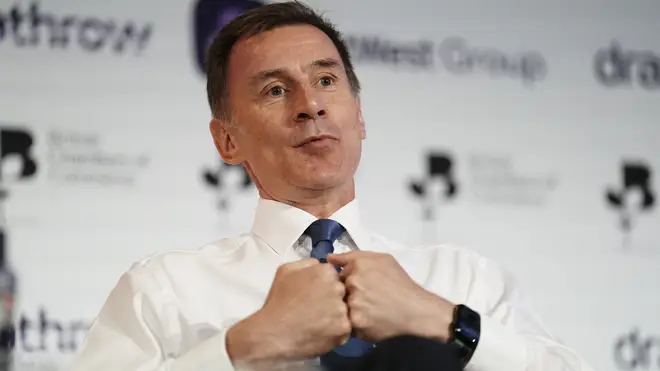
Ben Kentish 10pm - 1am
19 May 2023, 23:34

Jeremy Hunt said the push to cut inflation would result in tax cuts but he did not say when tax reductions would be announced.
The Chancellor has urged Conservatives “not to talk ourselves down” as he warned that creating an “inaccurate narrative” about Britain could make it into a reality.
Jeremy Hunt said he had noticed an “insidious declinism” creeping in among “those who used to be optimists like me” when it came to topics such as Brexit and UK economic performance.
It follows a week of blue-on-blue attacks in which Tories, including Home Secretary Suella Braverman, former business secretary Jacob Rees-Mogg and former Brexit negotiator Lord Frost, used a National Conservatism conference to challenge the Government’s record.
In an article for The Daily Telegraph, Mr Hunt said: “Let’s not talk ourselves down or allow a corrosive and inaccurate narrative about Britain to become a self-fulfilling prophecy.

“Conservatives know in our DNA that we are a great country with a bright future – if we choose it.
“So let’s get on and make it happen. After all, it’s what we were elected to.”
He defended Prime Minister Rishi Sunak’s focus on halving inflation by the end of the year, saying it was the “quickest way to put money back in people’s pockets”.
The Chancellor said cutting inflation would pave the way for tax cuts but he refused to put a date on when tax reductions would be announced.
Mr Sunak has made halving inflation one of his top five priorities, along with growing the economy, reducing debt, cutting NHS waiting lists and stopping boats of migrants from crossing the Channel to Britain.
Mr Hunt said: “High inflation is the most invidious tax rise of all, eroding 10% of our salaries and savings in the last year alone.
“Halving inflation this year, one of our five priorities, is the quickest way to put money back in people’s pockets, end industrial strife, restore consumer confidence and allow businesses to invest.
“And because it is the key to sustained growth, low inflation will allow us to bring taxes down, something we want to do as soon as possible.”
His comments come as energy bills were predicted to fall by as much as £450 when the new price cap is announced on May 25.
Predictions by market analyst Cornwall Insight indicate that there will be a decrease of £1,227 from the April cap, which was set at £3,280.
Consumers are not directly affected by the price cap due to the Government’s energy price guarantee (EPG), which limits a typical household’s energy bill to the equivalent of £2,500 per year.
However, starting from July, household bills will revert to the price cap, Cornwall Insight said.
Dr Craig Lowrey, principal consultant at the analyst firm, said: “Under these predictions, an average consumer would see bills drop by around £450 compared to the existing levels of the energy price guarantee, with bills currently predicted to stay relatively stable over the next nine months.”
But Cornwall Insight said that, while bills were falling, it did not expect them to return to pre-Covid levels “before the end of the decade at the earliest”.
“Regrettably, it looks as if these prices may become the new normal,” Dr Lowrey added.
The price of wholesale energy increased as Covid restrictions were eased and then rocketed after Russia’s invasion of Ukraine last year.
Energy prices have shown signs of easing in recent weeks but consumers continue to have their budgets stretched by rising food prices.